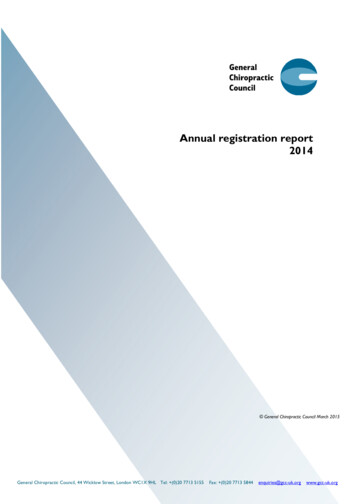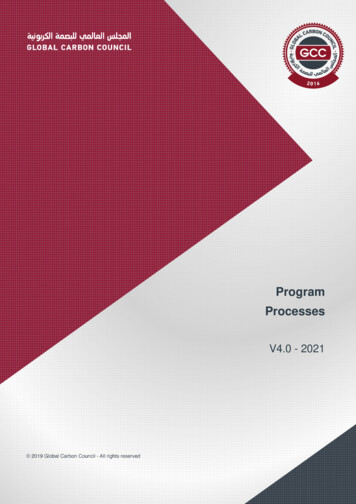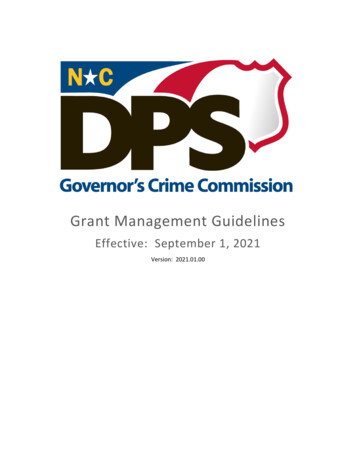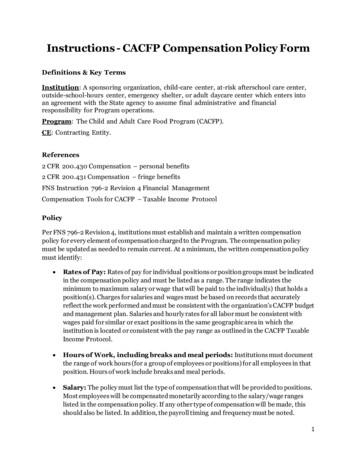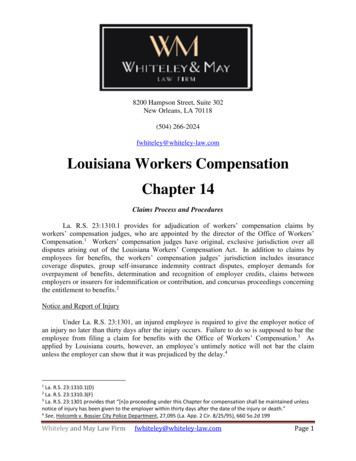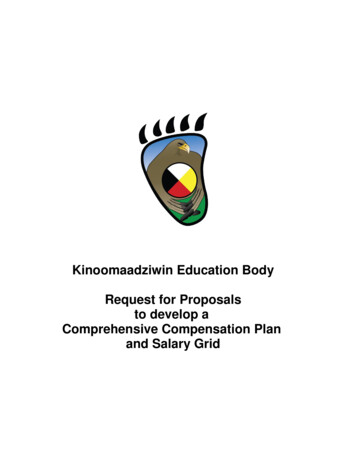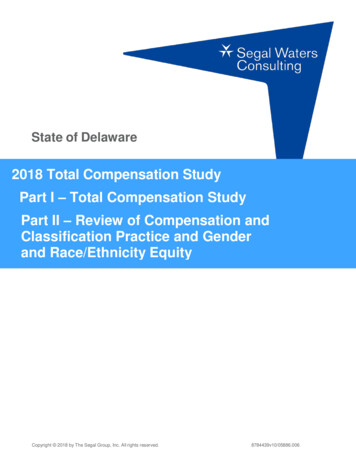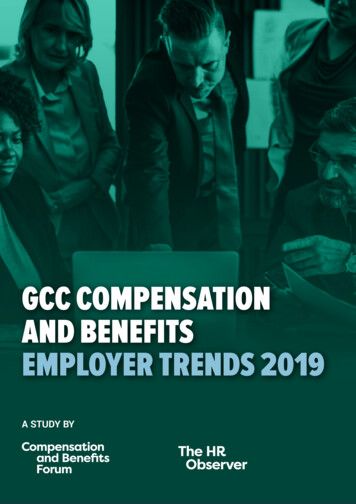
Transcription
GCC COMPENSATIONAND BENEFITSEMPLOYER TRENDS 2019A STUDY BY
GCC Compensation and Benefits Employer Trends2019The whole digital and technology area is very busy and if you are in thosemarkets there is a better chance that you are going to have an increasingsalary over the course of the next year or two.– Chris Greaves, Hays Gulf RegionIn terms of compensations and benefits, 2018 remained cautiously optimistic followingon the year’s C&B trends report. This was owing largely to the introduction of the VATimplementation in the GCC states. However, 2019 seems to be following a more decisivestance. The trend for the year appears to have companies preferring to offer attractivepackages rather than high salary brackets for expatriates. The focus also remains steadilyon hiring nationals. All in all, the GCC states are poised towards a buoyant 2019 - mostespecially in the digitalisation sector. Therefore, highly-skilled local talent can expect morelucrative salaries in recognition of their worth.A brief Overview of our MethodologyOur seventh annual GCC Compensation and Benefits (C&B) Trends Report comprises theresponses and insights of 564 participants drawn from a wide range of industries and HRroles. This increase in the scale of survey participants provides us with more insight intothe most critical challenges and impactful trends affecting C&B in the GCC. It also allowsfor the sharing of their proposed strategies in this rapidly changing economic environment.Participants have been drawn from companies located across GCC member states, themajority based in the UAE and Saudi Arabia. They represent diverse sectors, including;oil and gas, energy, healthcare, retail, construction, real estate, banking, manufacturing,education and government institutions. This year’s survey consisted of 22 questionsdesigned to discover the most crucial challenges and emerging trends currently affectingthe region’s C&B climate. The conclusions drawn in this report are based on the collectedanswers, clarifications, suggestions, proposed strategies and further insights of ourrespondents.1SALARY INCREASES, BONUSES AND ATTRITIONRATES IN THE GCC: UNCERTAINTY ANDCONSERVATIVE ESTIMATES CONTINUEThe majority of our 2019 survey participants feel that the year ahead is going to be amixed bag. While 24.5% of companies expect to give only a 3.5% increase or less, 7.5% areplanning to increase salaries by 4.0% and 5.7% aim to give a 5.0% increase. These are allmarkedly lower rates compared to 2018. However, instances of larger pay rises do seem tobe on the horizon for the GCC, as 13.8% of our survey’s participating companies expect toincrease salaries by between 5.0%-6.5% or even higher.The above findings are reflective of the Recruiter Sentiment Survey conducted by LinkedInbetween April-December 2018 of 300 in-house HR professionals and agency recruiters inthe UAE (Abu Dhabi, Dubai and Sharjah). The respondents were from 12 sectors, namelyaviation, automotive, R&D, staffing agencies, retail, marketing & communications, finance,hospitality, software & IT, manufacturing, hospital & healthcare and banking & finance.More than half of those surveyed (56.0%) stated that candidates have been demandingabove-average salaries post the roll-out of VAT in the region.www.totalrewardsme.com2
However, approximately 8.9% are expecting to freeze salaries and not give a pay rise,which gives a somewhat dampened outlook to the year. Although still unconfirmed, atleast 5.9% are most likely to reduce salaries, which is almost one per cent point higherthan in 2018.This somewhat prudent forecast for the lower end of the potential salary increase scalemay not end up being entirely representative of 2019. For example, 52.7% of this year’srespondents gave salary increases of 3.5% or less in 2018, a noticeable improvementfrom the predicted 20.4% of respondents that were expected to give 3.5% or less as a payraise. In 2018, 11.9% respondents gave a 4.0% increase; more significantly, 14.4% gavethe second biggest increase of 5.0%. The prediction for the year had been 4.0% (9.0% ofrespondents), followed by 5.0% (8.7% of respondents).In keeping with that, 10.1% gave a salary increase of 6.5% or more, although the predictionfor 2018 was that 4.0% would give 6.5% or higher. Salary increases in 2018 were actuallyhigher than predicted at the beginning of that year. However, the fiscal forecast for2019 as compared to the previous year is more varied. More companies are predictingincreases below 3.5%, at 4.5% or at or above 6.5%, than in 2018. In contrast, fewercompanies predicting increases of 4.0% and between 5.0%-6.0% for 2019 compared to2018. Apparently, some companies are optimistic in face of a higher increase given thepay freeze over the last few years. Some others though, are being cautious due to theeconomic challenges ahead.Mercer’s Total Remuneration Survey revealed a similar sentiment as it found that salariesare projected to increase by 4.8% in 2019 in the UAE across all industries, particularly inconsumer goods and high-tech industries. The energy industry, previously the highestpaying, is seeing a downward shift. The survey also noted that the GCC nation’s salariesacross all sectors increased by 4.5% this year, with the highest rise reflected in the lifesciences industries (5.0%).The Middle East Salary Survey 2019 by global recruitment firm Robert Walters found thatSaudi Arabia will see stronger salary growth at 2.0% on average across all fields. Growth inhiring will be highest in Kuwait City, Riyadh and Dubai.Bonuses and Attrition RatesPredictions regarding the state of bonuses in 2019 had 24.7% categorically state theywill not make a bonus payment for 2018. This is a definite statement compared to theuncertainty witnessed in 2018. It must also be stated that 11.9% said they could notdefinitely say what would happen. Only 20.4% paid out bonuses at the same level, while agreater number of lower bonus payments than before were mentioned by 17.2%.One outcome from our survey is that attrition rates are currently much higher at thebeginning of 2019 compared to early 2018. This year, 49.1% of respondents experienced5% or less attrition, while 23.2% suffered a rate of 10% or higher. This is an increase from2017 to 2018 and again to 2019. Almost identical to 2018, 38.1% can lay claim to anattrition rate of 4% or less this year. Muddying the waters somewhat, it is dismaying tolearn that 9.2% are not aware of their rate of attrition.The increase in attrition figures coupled with the precarious state of bonuses can be laid atthe door of a still fluid market facing the implementation of VAT and, even more, artificialintelligence (AI.) Digitalisation is expected to be at the forefront in 2019. As companiesincreasingly turn to automation, this is expected to impact jobs in the healthcare, transportand finance sectors. The fastest AI growth is predicted in the UAE, followed by SaudiArabia. The UAE Strategy for Artificial Intelligence forecasts that Dubai will become a worldleader in AI by 2031, generating up to US 90 billion in extra growth.www.totalrewardsme.com3
For countries such as the UAE, Bahrain and Kuwait, the projectedproportion of work, and by extension workers, displaced, is higher than theprojected global average.2– Jan Peter Moore, Associate Partner, McKinsey & CompanyTHE QUESTION OF VAT: THE GCC ADOPTS VIGILANTATTITUDEIt is interesting to see that despite the introduction of VAT, the UAE jobmarket and workforce appears to remain confident, according to the latestfindings of the LinkedIn Recruitment Survey. However, the new tax doesappear to be putting added pressure on businesses as candidates demandhigher salaries to compensate for the increase.– Ghassan Talhouk, Head of LinkedIn – UAE, LinkedIn Talent SolutionsThe process of VAT implementation in the GCC has started, but its slow progress acrossthe region means some member states still need time to make the necessary economic,political and technical preparations and adjustments. The UAE and Saudi Arabiaimplemented VAT in 2018, while Bahrain rolled out its VAT policy with effect from1 January 2019.Therefore, it is perhaps not surprising that the rather guarded approach we saw in the dataof last year’s report is still present in early 2019. As compared to 2018, 80.0% did not makesalary adjustments in 2018 to reflect VAT and 8.3% said they didn’t know. A further 69.2%will not be revising salaries in 2019 to reflect VAT, while 19.2% are still unsure of what theyear holds.Similarly, 86.0% said that they will not revise the benefits elements of their pay structure totake VAT into account. Some companies among the other 14.0% are considering offeringspecific benefits adjustments to offset VAT, such as a temporary living allowance. Othersare viewing VAT as an opportunity to benchmark, review or entirely realign their salary,allowances and benefits structures. This is in order to find the most attractive way tobalance total rewards versus individual benefits. These include allowances and benefits forhousing, utilities, private education, transportation, phone, etcetera, depending on their VATstatus.This trend is symptomatic of the still precarious state regarding VAT and its potentialimpact on the GCC economic landscape. Interestingly, despite the VAT, recruitment hasseen an increase, notably in the hospitality and IT sectors, while positions most in demandfrom employers are in the tax and finance sectors.www.totalrewardsme.com4
3AREAS OF FOCUS FOR THE C&B COMMUNITY IN2019: LOOKING AHEAD AND DOING MORE WITH LESSTop 6 Focus AreasImprove employee engagement45.4%43.8%Improve employee retentionManagement cost of employment41%Improve the link between pay and performance39.4%Design of performance management approachManage salary increases28.4%20.6%Most companies today start focusing on attracting the best calibresin the market due to the level of competition and quality of people. Infact, today, they want to get as much as they can from the market shareto survive in the market due to the dramatic changes in the economy.Therefore, they will review their C&B to be more attractive and increase theiremployee retention as well.– survey respondentThe above data demonstrates that five of the top six areas of focus for 2019 remainrelatively unchanged from 2018. This year is more about getting the most out of theemployees. In this context, it should be kept in mind that retention is key, as increasedturnover increases costs and reduces productivity. Companies need to find concretemethods to keep their employees engaged, as low morale and engagement translatesto low productivity. The fact that improving employee engagement has improved fromto 46.1% in 2019 (from 45.3% in 2018) to remain the top area of focus demonstratesthat GCC companies are still committed to looking beyond the bottom line. Increasedengagement leads to higher productivity and sales and the GCC is taking cognisance ofthis fact.Related to this is the increased focus on improving the link between pay andperformance, which rose slightly to 39.4% this year from 36.8% in 2018 - a small yetheartening outcome. As 2019 continues, it seems clear that more companies are eagerto create working environments where their employees feel engaged, secure and wellcompensated for their ongoing commitment and performance. Indeed, a Gallup articlepublished in November 2018 indicates that companies are also moving to the “employeeexperience” - which is the sum total of an employee’s life cycle including the manager, role,team, workspace and wellbeing. Employee engagement continues to remain crucial, asengaged employees generate most of the creativity, innovation as well as excellence in anyorganisation. Engagement is at the centre of the employee life cycle and increasing suchengagement is the responsibility of managers. Gallup’s analysis showed that a manageraccounts for 70.0% of the variance in team engagement.Given the hike in attrition rates that GCC companies are currently experiencing, theincreased focus on improving employee retention (up to 43.8% from 41.4% in 2018) isa predictable outcome. The continued volatility of the region’s economic landscape iscoupled with the fact that more ambitious companies are looking to use the situation toattract top talent. In effect, this means that retention will continue to be a key priority in theface of rising attrition.www.totalrewardsme.com5
The greater importance of managing the cost of allowances, up from 18.9% in 2017 to27.5% in 2018, is no longer an issue in 2019. The focus now is more on the design ofperformance management approach. However, many respondents still referred to theneed to cut costs.While there is much that is familiar about the C&B focus areas this year, there is alsoplenty of change to acknowledge and anticipate. Although the majority of respondentsstated that 2019 is looking similar to 2018 in general C&B terms, 29.2% see differences/new trends emerging. Some of these interesting trends include:··HR transformation (new operating model)Inclusion of non-monetary offerings like learning and developmentFor years HR has been saying to employees, that they are responsible for their owndevelopment. We have espoused that managers should coach their people. The reality isthat we often do not allow time for people’s self-development, and most managers are notcapable of coaching their people. Training of employees and in particular managementskills, will return. HR has neglected the development of organisational managers for toolong. HR teams will get smaller (since) we are increasingly automating our HR processes.The role of HR will change. To be successful for a career in HR, we need to ensure thatHR people are not just competent in the traditional things, but are IT literate, that they arecomfortable with data analytics and that they understand company politics.4– Mike Morrison, Consultant and Founder/Director, RapidBICRITICAL C&B CHALLENGES FOR 2019Top 5 Challenges Facing C&B In 2019Fluctuating economic conditions45.4%Driving productivity, motivation and employeeengagement via C&BCreating a flexible package that increasesemployee valueBuilding a strategic total rewards modelincreases employee valueCommunicating rewards strategy to employeesmodel increases employee value16.1%12.4%10.5%6.0%In 2018, 48.9% of our survey respondents cited fluctuating economic conditions as thebiggest challenge that they faced when trying to manage total rewards to effectivelydetermine their C&B strategy. In 2019, this figure now stands at 45.4%; reduced, but stillholding true for the year. With market changes outlined in previous sections still ongoing,this challenge is going to remain the most difficult and persistent C&B challenge for theforeseeable future.The next biggest challenge is driving productivity, motivation and employee engagementvia C&B, as chosen by 16.1% of participants in our 2019 survey. This aligns withcompanies’ increasing desire to make employees feel more engaged and improve the linkbetween performance and pay. This is further borne out by the 12.4% companies willingto create flexible packages that increases employee value. Although building a strategictotal rewards model dropped to fourth place for the year, it is still at a substantial 10.5%,aligning with the current emphasis on redesigning more effective C&B structures in theface of VAT implementation.www.totalrewardsme.com6
All of the other leading challenges cited by our survey participants claimed less than10.0% of the responses. However, it is interesting to note the drive towards strategic totalrewards (design and communication). At one of the high spots for 2019, this will be criticalfor the long-term health of companies operating in the rapidly evolving GCC economiclandscape.Tackling Rising Costs: Healthcare ProvisionRemains a Thorny IssueWe asked participants to name the top three areas of their total reward spend that arebecoming more costly. The main areas of concern for GCC companies in 2019 and whichremain similar to 2018 albeit with a slight decrease are:Healthcare provisionHousing and accommodationTraining and development64.0%47.5%34.0%Healthcare provision was the most significant reward spend difficulty in 2018. Identifiedby 68.6% as the most expensive area of C&B, it was a far greater number than any othersingle expense that year. This year, 64.0% marked it as their highest spend in the C&B area.This trend seems likely to continue for the next 3-5 years.Again, still holding true in 2019, very few GCC companies are looking to embrace wellnessprogrammes for improving employees’ overall health and subsequently reducing theirreliance on healthcare provision. It is possible their focus may be on transportationand travel; governmental fees; and salaries, rather than healthcare for employees. Aplausible reason for this could be that local citizens already have free – or almost free– access to healthcare. Since the focus is on nationalisation in terms of recruitment,wellness packages for expatriate employees are not at the high end of the scale for manyemployers.Employees’ Changing View on the Value of BenefitsMost employees still value basic pay more than benefits in 2019 according to 64.4% ofour respondents, which has slightly increased from the 62.9% that was recorded in 2018.Clearly, attitudes in 2018 were a precursor for 2019, with 53.0% of companies feeling theiremployees now value benefits more than they did in the past. Another 16.0% think thatemployees value them less and 31.0% say that perceptions haven’t changed.Much like 2018, the predicted lack of low level salary increases is coupled with companies’heightened desire to improve employee retention. This suggests that in 2019, more effortwill go into strategies for maximising the overall value of C&B packages through theeffective use of benefits. This is a continuation of the trend we saw emerging last year. Itstrongly suggests that companies who are designing better benefits offerings are enjoyingsome success in terms of changing attitudes. This, in turn, makes their employees valuebenefits more than they did previously.www.totalrewardsme.com7
Pensions: Potential Growth in 2019Many people are used to having their retirement planning effectivelyhandled ‘automatically’ through workplace pension schemes for exampleand don’t realise that just isn’t the case in the Middle East.– Chris Ball, Managing Partner, Hoxton Capital ManagementThe vast majority (81.2% as of 2019) of GCC companies are still not offering theiremployees any kind of private pension option. 10.5% are considering the possibility ofdeveloping a scheme, leaving only 8.3% of employers who currently offer one.5Some companies offered a pension plan for local nationals only and are now exploringoptions to offer a pension (or equivalent) to expatriate employees. While pensionsare clearly low on the priority list, they could gain a much more visible presence in theC&B landscape this year. It would be dependent on a sizeable portion of the 10.5% ofcompanies considering such an option, to fully develop and implement their plans.CHANGES IN THE C&B TECHNOLOGY AND SOLUTIONPROVIDER MARKETS FOR 2019Emerging technologies and the increased presence of highly responsive professional C&Bsolution providers are having a significant impact on GCC companies’ HR function. Morethan a third of respondents continue to utilise only Microsoft Excel to capture and analysetheir data in 2019 (31.9%). However, a good number (44.7%) have already invested intechnology, with 23.4% looking to follow suit in 2019.The majority of companies who have been applying a more rigorously technologicalapproach to their C&B data processes have experienced satisfactory results. Solutionsrange from international suppliers such as Oracle, SAP/Success Factors to a mix of localor in-house solutions in the majority of cases. No particular clear trend is visible. This trendof rising investment in technology ties in with companies’ overall priority to make their C&Bstructures much more efficient and effective by building new capabilities. More strategicand informed decisions are being made by leveraging the data at their disposal.In 2017, the number one consultancy was cited 2.5 times more than the number two, withonly a handful of respondents mentioning other any other providers. In 2018, the leadingconsultancy was only mentioned twice as much as its leading competitor, with otherproviders receiving more citations. In 2019, however, no particular mention was made ofthe big global consultancies.C&B Trends for 2019: Cautious but Positive OutlookThe outlook for the year remains slightly guarded, with 51 respondents saying they wishedfor better – or more – benchmarking in terms of internal HR data. Of those surveyed, 43respondents were actually looking to improve pay-related issues in terms of giving payraises. A further 37 respondents openly discussed how they’re ready to advance or changetheir career and 30 respondents contemplated higher budgets and ways to control costs.27 respondents looked at implementing specific benefits (either offering more or makingthem flexible to meet employee needs) while 23 respondents were looking at bettersystems to manage data. Eleven said they were looking at better ways to do analytics. Afurther 21 respondents referred to creating a C&B structure, asking for it to be aligned tothe market or competitive, while 19 respondents mentioned having a strategy in place.Only one respondent of the survey actually seemed to be satisfied with the current C&Bscenario.www.totalrewardsme.com8
In noteworthy development of 2018, employees in the UAE were also allowed to officiallywork part-time and to work for more than one employer at the same time. In terms ofpensions, the UAE is advancing in addressing the issue of financial wellness. Dr AbdulRahman Abdul Manan Al Awar, Director-General, Federal Authority for Government HumanResources, said authorities were conducting studies to improve the end-of-service benefitssystem, particularly as the age of retirement has increased. The benefits will likely includean enhanced gratuity system and private sector savings scheme. However, he did notprovide a timeline for the implementation of such improvements.In the many C&B policy decisions that need to be taken, GCC companies must remainproactive in spite of the challenges or uncertain factors. If they choose to confinethemselves to the role of observers, it will work to their detriment in the long run.Governments are moving to take control of the future – and corporates need do likewise inorder to remain relevant in the changing C&B scenario of the Gulf region.Extra es/story/Professionals working in talent short Saudi Arabiawill receive the highest salary increases in the Middle East in a/en/companies/story/Strong hiring confidence remains in the UAE butVAT introduction results in greater salary demands LinkedIn Survey-ZAWYA20190206065326?utmcampaign magnet&utm source article page&utm medium related USB2N1YO014www.totalrewardsme.com9
Conference: 17 – 18 June 2019Masterclasses: 16 & 19, 20 June 2019The Address Hotel, Dubai Marina, Dubai, UAERETHINKING REWARDS FORTHE FUTURE OF WORKThe 23rd Compensation and Benefits Forum will offer attendees a chance to hear frommarket leaders while also sharing ideas and best practice on restructuring total rewardsto meet market needs. With increased interactive sessions, the event will equip you withpractical information on how you can adopt and implement a selection of incentives tokeep your workforce engaged and motivated with improved performance.Find out more at www.totalrewardsme.comThe HR Observer is the region’s first of its kind initiative aimed at becoming a platformfor HR professionals to exchange insights freely both online and offline in efforts to helpdevelop the profession in the Middle East.Visit www.theHRobserver.com to know more.A SPECIAL THANK YOU TO:Agni Skafidas has spent over 18 years in general and specialised HRroles in the Middle East, Europe, the UK, the US and Asia. Her wealthof knowledge in HR, project management and coaching have drivenher success and commercial understanding. Being recognised for herachievements, Agni had the opportunity to lead HR teams inoperational and strategic roles and served as Director, Total Rewardsfor APAC and Emerging Markets based in Dubai before foundingOLAM.www.totalrewardsme.com10
The survey also noted that the GCC nation's salaries across all sectors increased by 4.5% this year, with the highest rise reflected in the life sciences industries (5.0%). The Middle East Salary Survey 2019 by global recruitment firm Robert Walters found that Saudi Arabia will see stronger salary growth at 2.0% on average across all fields.
